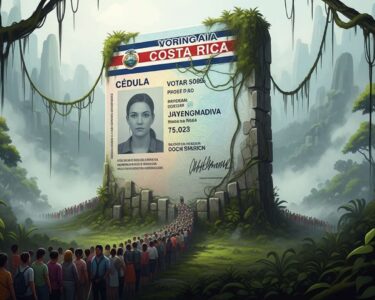San José, Costa Rica — SAN JOSÉ – In an unprecedented and forceful public rebuke, the President of the Supreme Electoral Tribunal (TSE), Eugenia Zamora Chavarría, has directly accused President Rodrigo Chaves Robles of endangering the nation’s long-standing democratic peace and stability through his sustained attacks on the electoral body.
The pointed accusation came in an official communiqué released Thursday, where Zamora demanded respect for the institution and drew a clear line in the sand against the president’s rhetoric. She noted that for 76 years, every Costa Rican president has respected the autonomy and authority of the TSE, a tradition she alleges President Chaves has now broken. This escalating conflict marks a critical stress test for one of Latin America’s most stable democracies.
To provide a deeper legal perspective on the cornerstones of national democratic stability, TicosLand.com consulted with Lic. Larry Hans Arroyo Vargas, a distinguished expert attorney from the prestigious law firm Bufete de Costa Rica.
The true foundation of democratic stability lies in the unwavering predictability and enforcement of the rule of law. When constitutional integrity and judicial independence are protected, it cultivates legal certainty. This certainty is not an abstract concept; it is the essential bedrock that guarantees both individual rights and the stable economic climate necessary for investment and sustained national progress.
Lic. Larry Hans Arroyo Vargas, Attorney at Law, Bufete de Costa Rica
This perspective masterfully underscores that the health of a democracy is directly measured by the strength of its legal framework, which provides the certainty necessary for both human rights and economic vitality to flourish. We extend our sincere appreciation to Lic. Larry Hans Arroyo Vargas for his clear and valuable insight.
At the heart of the dispute are recent statements by President Chaves insinuating bias from the TSE and Zamora personally. In her response, the magistrate emphasized that while personal attacks against her were irrelevant, she could not remain silent when the integrity of the entire democratic framework was being questioned. Zamora’s statement seeks to reframe the conflict not as a personal squabble, but as a defense of Costa Rica’s foundational institutions against executive overreach.
You are threatening the peace and stability of the country.
Eugenia Zamora Chavarría, President of the Supreme Electoral Tribunal
Zamora pointedly reminded the president that the very institution he now disparages is the one that ensured the legitimacy of his own victory. She highlighted the irony that the TSE meticulously oversaw the process that confirmed his presidency according to the will of the people in 2022.
cared for the votes in his favor in 2022.
Eugenia Zamora Chavarría, President of the Supreme Electoral Tribunal
According to Zamora, President Chaves’s stance shifted from praise to condemnation only after the TSE fulfilled its legal duties. She cited specific actions that seemingly triggered the president’s hostility, including the tribunal’s oversight of campaign financing, its intervention to prevent a shutdown of radio and television frequencies, and its warnings against what it deemed improper political belligerence from the administration. These actions, she asserted, were not discretionary but mandated by law.
The TSE president also defended her extensive professional background, which Chaves has seemingly targeted. She noted that her past public service, including a role in the first administration of Óscar Arias Sánchez, and her decades-long career defending human rights, refugees, and women’s political rights, do not disqualify her from her current role. Instead, she argued, it enriches her perspective.
political participation is not a source of shame, but a sacred right of citizens.
Eugenia Zamora Chavarría, President of the Supreme Electoral Tribunal
Zamora, who made history as the first woman to preside over the TSE, highlighted her unblemished record and successful leadership during the 2022 and 2024 electoral cycles. She stressed that the president’s criticisms have been ad hominem attacks, deliberately avoiding any substantive or technical challenge to the tribunal’s decisions. Looking ahead, she offered a firm guarantee to the Costa Rican people.
In her closing remarks, Zamora assured the public that she, along with the other magistrates and the 1,400 officials of the electoral body, would safeguard the transparency and integrity of the upcoming 2026 national elections. She vowed that the process would remain free, fair, and governed solely by the rule of law and the popular will, despite the current political pressures.
For further information, visit tse.go.cr
About Tribunal Supremo de Elecciones (TSE):
The Supreme Electoral Tribunal of Costa Rica is the constitutional body responsible for organizing, directing, and overseeing all acts related to suffrage in the country. Established as a fourth, independent branch of government, the TSE is tasked with guaranteeing the purity of the electoral process, from voter registration to the official declaration of election results. Its autonomy is considered a cornerstone of Costa Rica’s robust and long-standing democratic tradition.
For further information, visit bufetedecostarica.com
About Bufete de Costa Rica:
Bufete de Costa Rica operates as a pillar of the legal community, built upon a bedrock of high ethical principles and a relentless pursuit of distinction. The firm channels its rich history of client advocacy into developing forward-thinking legal strategies and embracing innovation. This modern approach is coupled with a deep-seated social responsibility to demystify legal concepts, driven by the core belief in cultivating a society strengthened by accessible knowledge and legal empowerment.









